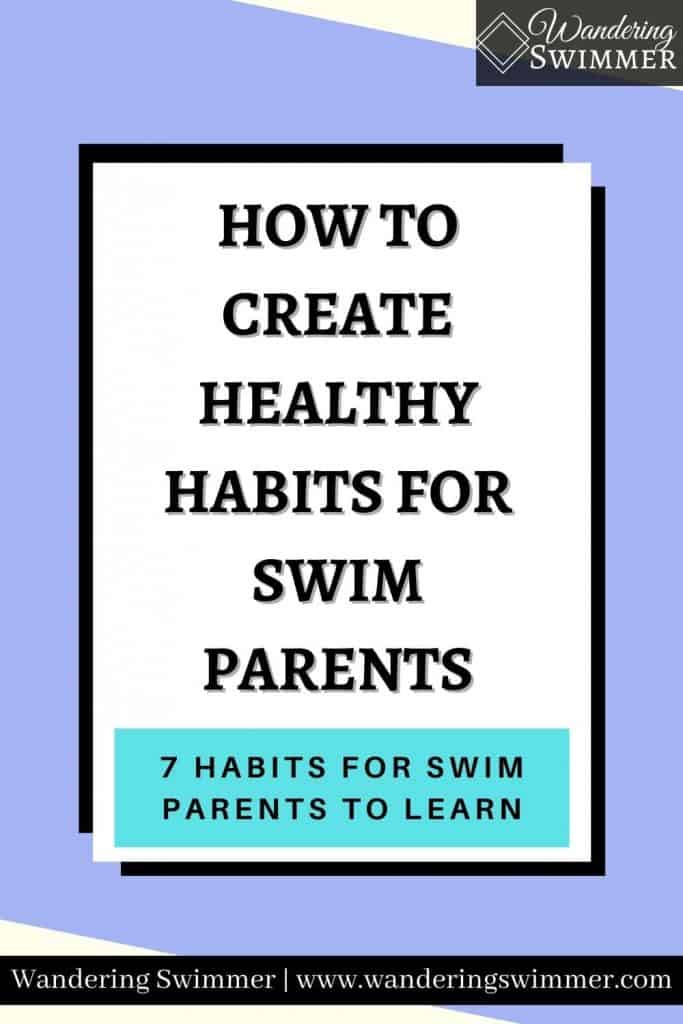As a parent, it’s easy to want to get involved in your child’s swimming. From practices to meets, and everything in between. And that’s great! But it’s important to develop healthy habits as a swim parent.
Because there does come a time where you can become too involved.
Yes, it’s a fine line between showing enough support and too much. Even more so, it takes self-awareness, along with the ability to step back and self-examine.
Developing healthy habits as swim parents leads to a better relationship with your child and the sport as a whole. And it has the added benefit of being healthy for you.
Disclosure: This post may contain affiliate links, meaning we earn a small commission at no cost to you if you purchase something through one of our links. As an Amazon Associate, we earn from qualifying purchases. Please check out our disclosure page for more information.

Encourage and Support your Swimmer(s)
And other swimmers!
A good habit to have as a swim parent is learning how to encourage and support your swimmer.
Not every race or practice will be their best. Your swimmer will face down challenges, frustrations, and disappointment.
We all do!
A healthy habit for swim parents is to offer support during these rough patches. You’re there for the tears and the setbacks. You’re the shoulder to cry on or be the silent support. And you need to know when to step back from being your child’s biggest fan to being a parent.
Yes, there’s a vast difference between the two.
Learning to juggle the two and find balance takes time. As a parent, you always want what’s best for your child. You want to see them find success at the pool and in life.
But if you don’t encourage them as a parent, then they’ll struggle to find that success. Cheer and support them as a parent. Not as their biggest fan who sees no faults or only faults in all that they do.
Know When to Stop Talking about Swimming
Despite popular belief, most swimmers don’t like to talk about swimming all the time. And truthfully, they probably shouldn’t surround themselves with it in every aspect of their life.
For highly competitive swimmers, the sport practically drives their life. Having a parent that only wants to talk about swimming isn’t healthy for any swimmer. And it’s not good for you either.
Want to be a better swim parent? Learn how to disconnect with swimming on occasion.
If your child doesn’t want to talk about swimming, then don’t keep talking about swimming. It’s aggravating as swimmers when parents only ever want to talk about the sport. About how practice was and what times ‘so and so’ swam the other day.
Related article: 8 Things Every Swim Parent Should Know
Just like you need a break from swimming, so does your child. You wouldn’t like it if you had to keep talking and thinking about work when all you wanted was a break from it.
It’s the same thing for swimmers.
Not sure? Ask your swimmer. You might be surprised when they admit that they don’t like talking about swimming all the time. Especially with their parents.
If they tell you that they want to stop discussing swimming, then listen to them. In doing so, you’ll more than likely improve your relationship with your child and probably realize how over-involved you are in the sport.
Volunteer
Want to be an awesome swim parent? Volunteer.
It’s humbling, rewarding, and makes for a great habit that you can easily develop. When you volunteer, it sets not just an example for your children, but also the other adults around you.
And volunteering isn’t just limited to swim meets.
Check with other parents to see which swimmers might need carpooling to get to and from practice. Who needs someone to watch the house or pets while they’re out for a meet or trip?
Volunteering doesn’t have to be something large. Even small things can make a large impact on someone else.
It’s a great habit to get into. Not just as swim parents, but also as humans. 🙂

Don’t Compare Your Swimmer(s) to Other Swimmers
One mistake we see parents make is comparing their swimmer to another swimmer. Or, focusing so much on other swimmers that it’s all they talk about.
Whether they mean it as just informative or as encouragement doesn’t matter. It’s unhealthy. For both your child and you. And it’s a sure way to turn your child away from the sport.
If you want to be a good swim parent and form healthy habits, stop doing this. You can do this by:
- Not tracking times and results on social media or an online meet app
- If you follow them on an online meet app, remove them from your watch list
- Stop reading up on results for a meet that your child didn’t swim at
- Unfollow their parents on social media if they like to post results online
Doing this might make you feel out of the loop, but we promise you, your swimmer probably knows what their competition is doing. They keep informed of the swimmers in their area and events. If they want to, they’ll mention what ‘so and so’ did at a recent meet.
The best part of this? It frees up your time! You can spend hours looking up this information for no purpose other than ‘to be in the know.’ It’s not worth it in the end. You truthfully gain nothing by knowing this information.
It won’t make your swimmer drop time or swim faster. It only puts more pressure on them that they don’t need.
Don’t Play the Coach
At some point in time, everyone plays the coaching figure. Even swimmers find themselves trying to coach teammates at times.
Most times, though, you’ll see parents trying to be the coach for their child. Not just in swimming, but in any sport. They want to be the first person their child talks to before and after a race. Telling them what they should or shouldn’t do.
Related article: How Can I be a Good Swim Parents?
This comes down to our biggest point. You might think you’re helping by offering suggestions, but you’re not. You aren’t an expert just because you’ve watched your child swim for years.
And more than likely, you’re probably annoying and stressing your child out by doing so.
Do you have a right to make suggestions and ask questions? Of course! But those should go directly to the coach and not your child. You might find yourself surprised to learn that the coach told your child to make those very same changes months ago.
A little bit of perspective and open-mindedness to hear both sides of the story can go a long way. For all parties involved.
It also has the bonus of making you an awesome swim parent instead of an over-involved swim parent 😉
Respect Swimmers, Parents, and Coaches
Treat everyone with kindness and respect. It’s that simple.
Great swim parents (and teammates) cheer for other swimmers, even when they’re considered competition. They don’t pit swimmers against each other or talk negatively about other families.
Doing so only shows how shallow and petty you are. It’s not a good look and doesn’t teach your child anything positive.
Because respect isn’t just about cheering for other swimmers.
It’s about congratulating them, even if they beat your child. It’s when you tell other parents that their child had a great race. And it’s learning to treat everyone in the same way that you want others to treat you.
Related article: Swim Meet Etiquette for Swim Parents
You wouldn’t like it if someone’s family isolated your child or said nasty things about them. So don’t treat another swimmer, family, or coach that way.
Common courtesy goes a long way. From saying ‘good luck’ to ‘good swim’. Start taking a more proactive approach with those around you and you’ll find that more people will respect you for it.
This is how good swim parents become great and better swim parents!
Celebrate Their Success, not Yours
When your child wins, it’s their success, not yours. You didn’t swim the race, they did.
Therefore, when your child wins or gets a certain cut, don’t make it about you. Don’t point out that they’re your child or draw attention to yourself.
Let them enjoy the thrill of victory at that moment. First with their teammates and coach, and then with you.
It’s incredibly unhealthy to make someone’s accomplishments about you or claim them as your own. Don’t take that win from them.
In Closing
We’ve all seen the over-involved and crazy swim parents at meets. The ones that make you cringe due to how they act. Are we guilty of some of those behaviors? Probably?
But that’s part of learning and growing as a parent.
We hope this made you think and strive to form healthy habits as a swim parent. Remember that doing so betters your relationship with your children and gives them a healthier relationship with the sport.
You’ll make mistakes as a swim parent. Swimmers and coaches make mistakes too! It’s whether you learn and grow from them instead of stubbornly refusing to change that makes the difference.
The difference between a swim parent and an awesome swim parent.
As always, to happy swimming!
Chevron
Bonus Content:
9 Words Swim Parents Should Know: New to being a swim parent? To help better understand your swimmer, here are 9 easy words that swim parents should know.
The Rudest Things Parents can do at Practice: Every team has a parent that is rude. Whether you’re new to swimming or not, here are the rudest things parents can do at swim practice. (coming soon)

Want to Improve at the Pool?
Join swimmers and swim parents to receive my free newsletter and receive a free Swimming Glossary e-book as a thanks!
Every month you’ll receive tips and coaching to help you find success at the pool.
About

Chevron is a current competitive swimmer with almost 20 years of experience in the pool. And although she fell into the sport by accident in her high school years, she still trains daily and competes throughout the year. She’s committed to providing guidance to all levels of swimmers and believes that everyone should know how to swim.